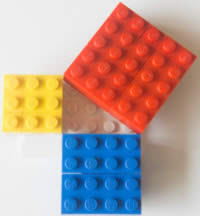
A "Pythagorean Triple" is a set of positive integers, a, b and c that fits the rule:
Calculating this becomes:
Yes, it is a Pythagorean Triple!
When a triangle's sides are a Pythagorean Triple it is a right angled triangle.

Here are two more Pythagorean Triples:
| 5, 12, 13 | 9, 40, 41 |
| 5 2 + 12 2 = 13 2 | 9 2 + 40 2 = 41 2 |
| 25 + 144 = 169 | (try it yourself) |
And each triangle has a right angle!
Here is a list of the first few Pythagorean Triples (not including "scaled up" versions mentioned below):
| (3, 4, 5) | (5, 12, 13) | (7, 24, 25) | (8, 15, 17) |
| (9, 40, 41) | (11, 60, 61) | (12, 35, 37) | (13, 84, 85) |
| (15,112,113) | (16, 63, 65) | (17,144,145) | (19,180,181) |
| (20, 21, 29) | (20, 99,101) | (21,220,221) | (23,264,265) |
| (24,143,145) | (25,312,313) | (27,364,365) | (28, 45, 53) |
| (28,195,197) | (29,420,421) | (31,480,481) | (32,255,257) |
| (33, 56, 65) | (33,544,545) | (35,612,613) | (36, 77, 85) |
| (36,323,325) | (37,684,685) | . infinitely many more . | |
The simplest way to create further Pythagorean Triples is to scale up a set of triples.
Which also fits the formula a 2 + b 2 = c 2 :
If you want to know more about them read Pythagorean Triples - Advanced
We can use these triples to make a right angle in the real world (such as with carpentry, tiling, etc)
The simple (3,4,5 triple) is the easiest to remember.
And if you need a triple with two nearly equal sides use (119,120,169) or (696,697,985).